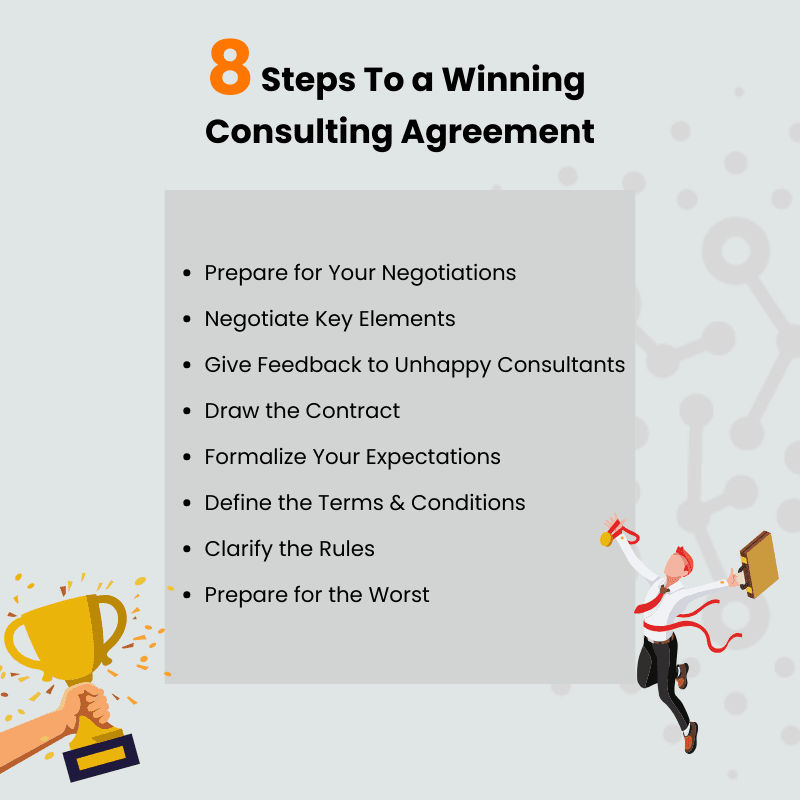Every ambitious endeavor, be it a magnificent skyscraper or an impactful business project, begins with a blueprint. Israelmore Ayivor’s words remind us, “Every great building once begun as a building plan… It is the same with dreams.”
For businesses, this blueprint is the consulting agreement – a cornerstone upon which transformative projects are built. This document is not just a set of terms and conditions; it’s the embodiment of trust, clarity, and mutual understanding between businesses and their consultants.
It’s the compass that ensures all parties remain on course, even when navigating challenging terrains. Drawing up a robust consulting agreement requires precision, foresight, and astute negotiation skills.
As we venture into this guide, you’ll be furnished with a systematic approach to negotiating and crafting a consulting agreement that stands the test of time, challenges, and changing business tides.
1. Prepare for Your Negotiation – What You Need to Do
Before you dive into the key elements, take the time to prepare for your negotiation. The first step is to agree on what you want to negotiate. With intangible services, almost all the components of the proposals are negotiable. You can modify anything from the scope, the team composition, to, of course, the price.
You also need to keep in mind the overall value of the project vs. the price. Understanding the dynamics of the pay-off matrix will help you define the needed magnitude of the negotiation. Now, look also at how much latitude you will have in the negotiation. Do you have a negotiation edge? Or are your hands more or less tied?
Finally, get the right people at the table based on the size and the strategic importance of the project. No spending weeks negotiating cost when fixing the issue yields more each week than the cost of the project.
Try to anticipate as much as possible how the consultants will act to get the best deal. In this situation, the best deal is when both parties have a positive outcome.
2. Negotiate the Key Elements – What Not to Miss
When you enter a negotiation with multiple dimensions, the BATNA (Best Alternative To Negotiate Agreement) and ZOPA (Zone Of Possible Agreement) concepts can come in handy. They will allow you to draw a bundle of potential deals along the different dimensions.
To build such a bundle, you will need to analyze how the changes in scope or team staffing will impact the price and conversely identify the trade-offs you are willing to accept. Do not lose sight of the ball, usually it is better to achieve your expected results than a half-baked result at low cost.
If you still need to reduce the costs, you should explore other savings opportunities such as travel expenses, or expert staffing.
3. Give Feedback to the Unhappy Consultants
Don’t forget to debrief the consultants who lost the project. Take the time to explain why they didn’t get the project and what they could have done differently. It will help them improve their proposals for your next project or with their next client.
You can also ask the consultants to give you some feedback on the project as well. It can bring you some valuable insights on how your teams manage a consulting project, and help you improve your practices.
4. Draw the Contract
“A contract is only as good as the people signing it.” – Jeffrey Fry
Crafting a comprehensive contract is like constructing a building: it requires a solid foundation, clear blueprints, and the right materials. When it comes to consulting, the contract is the backbone that ensures transparency, clarity, and mutual trust.
Depending on the nature of your relationship with the consultant and the scope of work, there are a few types of agreements you can consider:
- Standard Consulting Agreement: This is a generic contract suitable for most one-off consulting projects. It’s straightforward and typically covers essential terms such as scope of work, payment terms, and confidentiality clauses.
- Master Service Agreement (MSA) + Statement of Work (SOW): If you find yourself returning to the same consulting firm or professional for multiple projects, an MSA is an efficient choice. It sets out the general terms of the relationship, like payment terms, confidentiality, and dispute resolution. Subsequent projects can then be kicked off with individual SOWs, which detail specific project parameters without needing to rehash the overarching terms.
READ MORE: MSA, SOW, Consulting Agreements: The Definitive Guide (2023)
While using the template proposed by the consulting firm might seem convenient, it’s crucial to involve your legal team when drafting or customizing these documents.
Lastly, always keep the contract’s language clear and jargon-free, ensuring all parties have a clear understanding of their responsibilities. A well-drafted contract minimizes ambiguities, which in turn reduces the chances of disputes down the line.

5. Formalize Your Expectations
Even if you work with a standard consulting agreement, the Statement of Work is the first element to include in the contract. It covers the scope of work & deliverables, the schedule & phasing, the Governance & Escalation procedure, and the expected outcomes & metrics.
The contract is always the reference in case of litigation. You want the consultants to commit to the results of the project, not the means.
6. Define the Terms & Conditions – How and Why
When you have described what work will be done, how and when, it is time to define how the consultants will be paid. Even if you have opted for a flat fee, the schedule and the terms of payments should be clearly stated in the contract.
If you work with hourly fees or performance-based fees, you should include the conditions to get paid and the potential safeguards to avoid derailment.
7. Clarify the Rules
Depending on the project, and the company, some rules should be included in the agreement.
- Confidentiality– This clause should always be involved in a consulting agreement. Many projects include confidential information about the company’s strategy or products.
- Use of Third-Party– Many Consulting Firms work with subcontractors or partner with other firms on projects.
- Intellectual Property– Monitor the information and the models developed during the project and clarify the ownership in the contract.
- Client Policies (such as information management and safety)–The Consultants should comply with any rules that you might request.
- Conflict of Interest and Non-Compete– On some projects, you might want to make sure that the consultants won’t have any conflict of interest, or won’t go and sell the methodology they developed for you to your competition.
8. Prepare for the Worst – Avoid the Risks and the Pitfalls
It’s a universal principle in both life and business: “Hope for the best, but prepare for the worst.” When formulating a consulting agreement, this mantra is indispensable.
Firstly, it’s essential to acknowledge that even with the best of intentions and the most meticulous planning, unforeseen challenges can arise. Economic downturns, changes in leadership, shifts in market dynamics, or even global crises can dramatically affect a project’s trajectory.
Therefore, your contract should be proactive and not just reactive. Identify potential areas of vulnerability in your collaboration – be it in the form of delayed deliveries, miscommunication, changes in scope, or budgetary concerns. For each of these challenges, incorporate clauses that provide clear pathways to resolution.
Conclusion – Negotiating and Preparing Your Consulting Agreement
Crafting an effective consulting agreement is more than just ticking boxes and dotting the i’s. It is an intricate blend of understanding, foresight, and strategic negotiation. By following these eight steps, you lay a solid foundation for a consulting relationship that thrives on clarity, trust, and mutual respect.
Remember, like the mighty structures that rise from mere blueprints, a well-structured consulting agreement can pave the way for projects that transform visions into tangible realities. So, the next time you find yourself at the negotiation table or drafting an agreement, let this guide be your beacon, ensuring that both dreams and projects stand tall and unwavering.
consulting agreement consulting agreement consulting agreement
consulting agreement consulting agreement consulting agreement
consulting agreement consulting agreement consulting agreement

How Consource Can Help?
With Consource at your side, preparing consulting agreement becomes a hassle-free experience. Crafting an effective consulting agreement is a combination of intricate blend of understanding, foresight, and strategic negotiation and our platform helps you to quickly craft agreement using your templates and RFP specifications, while integrating industry best practices right into the process.








0 Comments